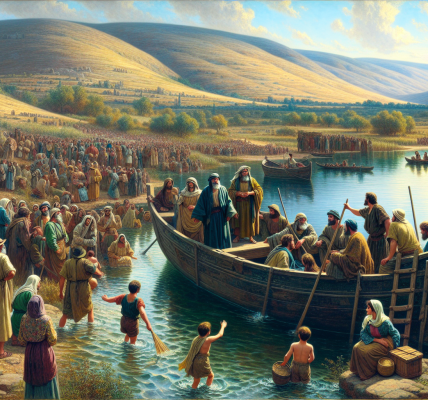**The Cheerful Giver: A Story of Grace and Abundance**
The sun rose over the city of Corinth, casting golden light upon the bustling streets and the quiet corners where the faithful gathered. In one such humble meeting place, the believers of Corinth sat together, listening intently as their teacher, a man named Gaius, unrolled a letter from the Apostle Paul. The parchment was worn from travel, but the words upon it were alive with urgency and hope.
“Brothers and sisters,” Gaius began, his voice steady, “Paul writes to us again, and his heart is full of encouragement—and a challenge.” He cleared his throat and read aloud:
*“Now concerning the ministry to the saints, it is superfluous for me to write to you…”* (2 Corinthians 9:1).
The room was silent as the words settled over them. Many had already heard of the collection being taken up for the suffering believers in Jerusalem. The famine had been severe, and the church there was in great need. Paul had urged the Gentile churches—Macedonia, Achaia, and now Corinth—to give generously, not as an obligation, but as a joyful response to God’s grace.
A woman named Lydia, known for her hospitality, leaned forward. “He says it is *superfluous* to write to us,” she mused. “Because he knows our hearts are willing.”
Gaius nodded. “Yes. Paul reminds us that we were the first to give—not only in action but in desire.” He continued reading:
*“For I know your readiness, of which I boast about you to the Macedonians, namely, that Achaia has been prepared since last year…”* (2 Corinthians 9:2).
A murmur of agreement spread through the room. The Corinthians had indeed pledged to give a year ago, and their zeal had even stirred the Macedonians—who, though poor themselves, had given beyond their means.
But then Gaius’s tone grew more solemn as he read Paul’s next words:
*“But I am sending the brethren, that our boasting about you may not be made empty in this case, so that, as I was saying, you may be prepared…”* (2 Corinthians 9:3).
A young man named Stephanos shifted uncomfortably. “Does Paul fear we will not follow through?”
Gaius shook his head. “Not fear—but he knows the temptation of good intentions without action. He wants our gift to be ready *as a blessing*, not as something squeezed out under pressure.”
Lydia clasped her hands. “Then let us ensure it is so. Let no one say we were eager in word but slack in deed.”
Gaius smiled and continued, his voice lifting with the next verses:
*“Now this I say, he who sows sparingly will also reap sparingly, and he who sows bountifully will also reap bountifully…”* (2 Corinthians 9:6).
The imagery was vivid—a farmer scattering seed. Those who held back their grain would see meager harvests, but those who cast their seed generously would reap an abundance. The principle was clear: God’s economy was not one of scarcity, but of multiplication.
An elderly man named Clement, who had once been a gardener, chuckled. “A stingy hand makes for a thin crop,” he said. “But a generous one? Ah—the harvest overflows.”
Gaius nodded and pressed on, his voice gaining strength:
*“Each one must do just as he has purposed in his heart, not grudgingly or under compulsion, for God loves a cheerful giver…”* (2 Corinthians 9:7).
The word *cheerful* lingered in the air. Not reluctant, not resentful, but *joyful*. Giving was not about meeting a demand—it was about reflecting the heart of God, who had given His own Son freely.
Stephanos exhaled. “Then it is not the amount that matters most, but the spirit in which we give.”
“Exactly,” Gaius said. “And see what Paul says next—God is able to make all grace abound to us, so that we may *always* have enough, and more, for every good work!”
The promise was breathtaking. God would supply their needs—not so they could hoard, but so they could give again.
By the time Gaius reached the end of the passage—speaking of how their generosity would produce thanksgiving to God and deepen the bonds of fellowship—the room was alive with excitement.
Lydia stood. “Let us finish what we started. Let our gift be ready, not as an afterthought, but as a celebration of God’s goodness to us.”
And so, in the days that followed, the Corinthians gathered their resources—some giving from their abundance, others from their poverty, but all with joy. When the messengers from Paul arrived, they found not reluctance, but eagerness; not scarcity, but a harvest of grace.
And just as Paul had said, their generosity became a fragrant offering to God—a testimony of faith, a seed sown in love, yielding a harvest far greater than they could imagine.
For God, who supplies seed to the sower and bread for food, would surely multiply what they had given—and increase the fruits of their righteousness.
And so, the church in Corinth learned the deepest truth of all:
*It is more blessed to give than to receive.*




